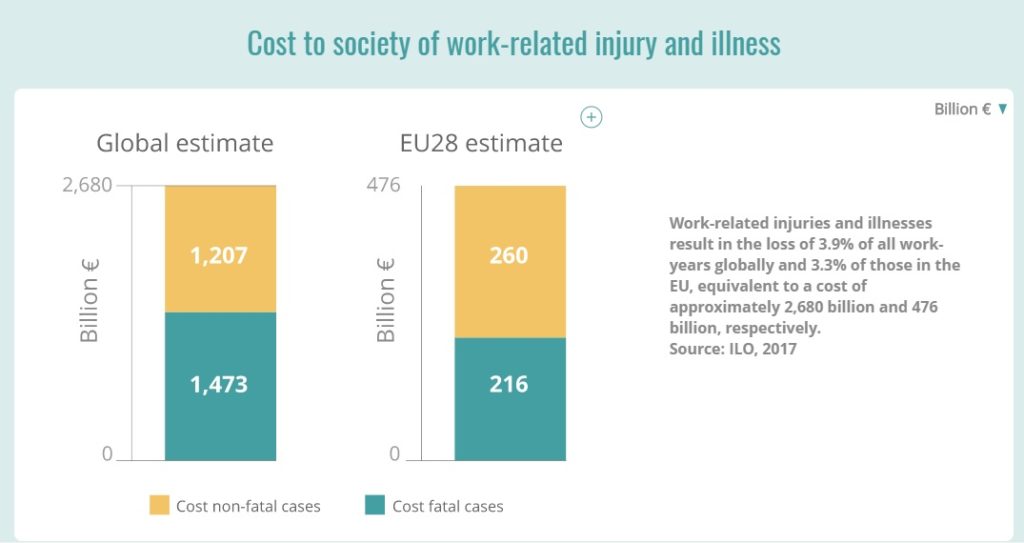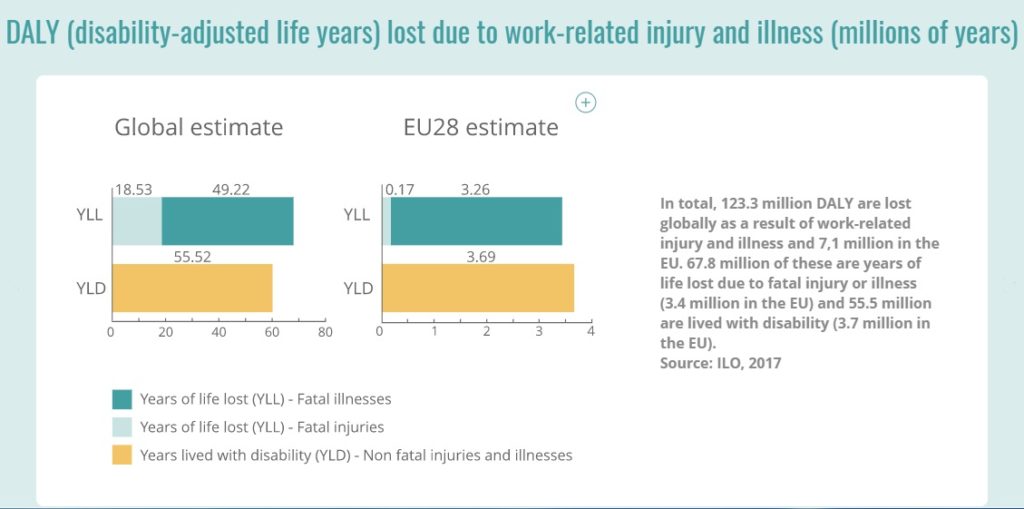The estimates are findings from a major project on the costs and benefits of OSH. The project was carried out by ILO, the Finnish Ministry of Social Affairs and Health, the Finnish Institute of Occupational Health (FIOH), the WSH Institute in Singapore, the International Commission on Occupational Health (ICOH) and EU-OSHA.
Fundamental human right
 Speaking ahead of the World Congress, the director of EU-OSHA, Dr Christa Sedlatschek, said: ‘Safe and healthy work is a fundamental human right but these new estimates of the costs of poor or non-existent OSH measures show that the economic case for OSH has never been stronger.
Speaking ahead of the World Congress, the director of EU-OSHA, Dr Christa Sedlatschek, said: ‘Safe and healthy work is a fundamental human right but these new estimates of the costs of poor or non-existent OSH measures show that the economic case for OSH has never been stronger.
“Work-related ill-health and injury is costing the European Union 3.3 % of its GDP. That’s €476 billion every year which could be saved with the right occupational safety and health strategies, policies and practices.’
Good practice in OSH can help make businesses productive, competitive and sustainable, as well as reducing healthcare costs and other societal burdens. But the costs of poor OSH are high — for individuals, business and society. Through the costs and benefits project, EU-OSHA has taken steps to identify and evaluate the data that is available in the EU and worldwide to develop accurate and up-to-date estimates of the costs of work-related diseases and injuries.
Other findings
Further findings presented at the World Congress include:
- Work-related illnesses account for 86 % of all deaths related to work worldwide, and 98 % of those in the EU.
- 123.3 million DALY (disability-adjusted life years) are lost globally – 7.1 million in the EU) as a result of work-related injury and illness. Of these, 67.8 million – 3.4 million in the EU – are accounted for by fatalities and 55.5 million – 3.7 million in the EU – by disability.
- In most European countries, work-related cancer accounts for the majority of costs – €119.5 billion or 0.81% of the EU’s GDP – with musculoskeletal disorders being the second largest contributor.
Data visualation tool
A new data visualisation tool, developed by EU-OSHA as part of the project, was also unveiled at the World Congress.
 It shows the global costs of work-related illnesses and accidents in an accessible way. Key results are presented as infographics, allowing researchers and policy-makers to explore the findings quickly and easily. With transparency and ease of use in mind, the visualisation tool also provides a glossary of frequently used terms, and a guide to the methods used.
It shows the global costs of work-related illnesses and accidents in an accessible way. Key results are presented as infographics, allowing researchers and policy-makers to explore the findings quickly and easily. With transparency and ease of use in mind, the visualisation tool also provides a glossary of frequently used terms, and a guide to the methods used.
EU-OSHA is one of the Congress’s supporting organisations and co-organising two symposia. One related to the costs and benefits project; the other examined evidence-based good OSH practice in micro and small enterprises, with reference to EU-OSHA’s work in this area and its OiRA (Online interactive Risk Assessment) project.

 Speaking ahead of the World Congress, the director of EU-OSHA, Dr Christa Sedlatschek, said: ‘Safe and healthy work is a fundamental human right but these new estimates of the costs of poor or non-existent OSH measures show that the economic case for OSH has never been stronger.
Speaking ahead of the World Congress, the director of EU-OSHA, Dr Christa Sedlatschek, said: ‘Safe and healthy work is a fundamental human right but these new estimates of the costs of poor or non-existent OSH measures show that the economic case for OSH has never been stronger. It shows the global costs of work-related illnesses and accidents in an accessible way. Key results are presented as infographics, allowing researchers and policy-makers to explore the findings quickly and easily. With transparency and ease of use in mind, the visualisation tool also provides a glossary of frequently used terms, and a guide to the methods used.
It shows the global costs of work-related illnesses and accidents in an accessible way. Key results are presented as infographics, allowing researchers and policy-makers to explore the findings quickly and easily. With transparency and ease of use in mind, the visualisation tool also provides a glossary of frequently used terms, and a guide to the methods used.